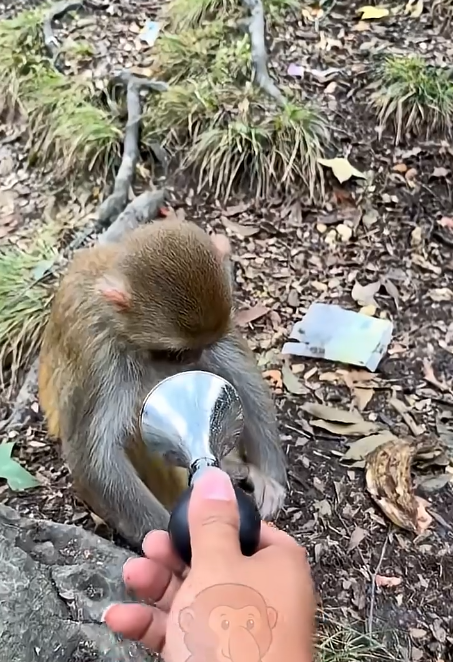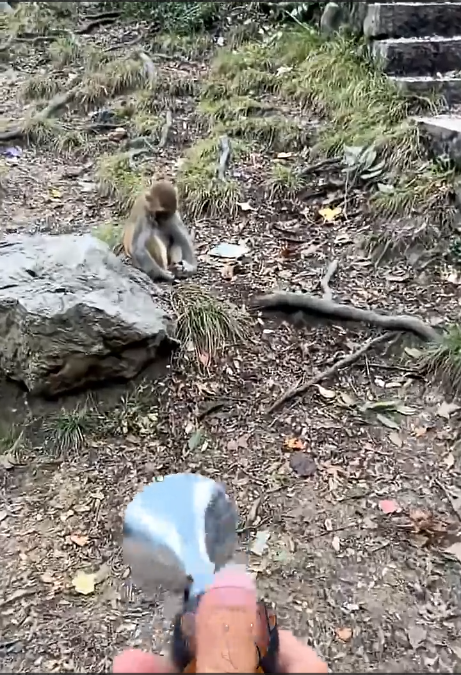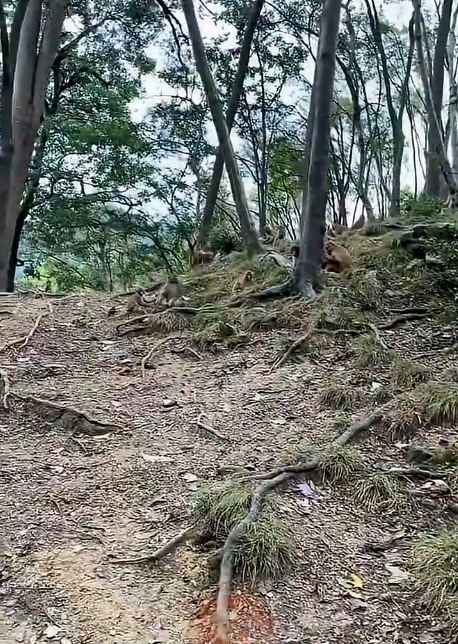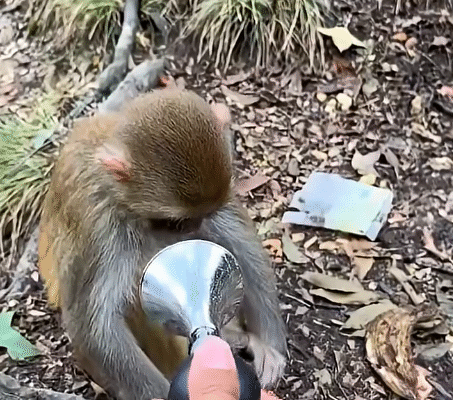
The morning sun had barely risen over the dense jungle canopy when the first giggles of mischief echoed through the trees. It was another day of chaos and comedy in the monkey troop—a bunch of cheeky little troublemakers who never failed to turn an ordinary day into a hilarious adventure.
I’d been visiting this group of monkeys for months now, and every day brought a new story. Some days they were sweet and cuddly, other days wild and unstoppable. But no matter what, they were always funny. The moment I stepped into the clearing with my basket of fruits, I already knew something was up—the trees were suspiciously quiet.
“Hello?” I called out.
Silence. Then, out of nowhere, a mango hit me square on the head! I looked up and saw three tiny faces peeking from the branches above, their eyes wide with mischief. The leader of the trio, a young monkey named Tiko, was grinning proudly, holding another mango like a weapon.
“Oh, so that’s how it is today?” I laughed. “A fruit ambush?”
Before I could react, splat!—another mango hit the ground near my feet. I couldn’t help but burst out laughing. Tiko and his little crew were having the time of their lives. They jumped up and down, hooting and clapping their tiny hands as if they’d just pulled off the greatest prank in monkey history.
When I finally tossed a banana up at them in return, the monkeys went wild. They leaped from branch to branch, dodging imaginary attacks, shrieking in fake panic. It turned into a full-blown food fight—mangoes, leaves, and laughter flying everywhere.
After the chaos settled, Tiko climbed down, holding what was left of a mango, and plopped himself right beside me. His face was covered in orange pulp, his eyes sparkling with mischief. He looked up at me as if to say, “You have to admit—that was funny.”
And honestly, it was.
Just when I thought the morning couldn’t get any funnier, another monkey—Mira, the self-appointed “queen” of the group—decided to show off. She strutted across a low branch, standing tall and dramatic. The other monkeys gathered below, watching her like an audience at a show.
She stretched her arms wide, puffed her chest, and then… slipped!
With a surprised squeak, Mira fell right into a pile of leaves. For a second, there was silence. Then the whole troop burst into laughter—yes, monkeys can laugh! It was a chorus of chirps and squeals, pure joy echoing through the jungle. Mira poked her head out of the leaves, shaking them off, clearly embarrassed—but then she grinned and joined in the laughter too.

What made monkeys so entertaining wasn’t just their energy, but how much they reminded me of people. They teased each other, played jokes, comforted their friends, and even pulled dramatic stunts for attention.
Later that day, I sat by the river, unpacking my lunch. The monkeys gathered around like curious children. I took out a piece of bread, and immediately Tiko reached out to grab it. “No, no,” I said, laughing. “You already had plenty.”
But Tiko wasn’t giving up that easily. He sat in front of me, crossed his little arms, and pouted. Yes—pouted. His lips stuck out, and he turned away dramatically, pretending to ignore me. The others watched him, tilting their heads, confused by his little performance.
Finally, I tore off a small piece of bread and handed it to him. Instantly, his mood flipped. He squeaked happily, jumped up, and did a little spin. The other monkeys clapped as if he’d just won an award.
“Drama king,” I muttered, shaking my head.
As I watched them eat and play, the troop began another round of antics. One monkey found a shiny metal cup I’d brought along. Fascinated, he stared at his reflection inside it. He tilted his head left, then right, then suddenly started making faces—baring his teeth, puffing his cheeks, even sticking out his tongue!
The others crowded around, equally fascinated. One by one, they all took turns looking at themselves in the cup. Some shrieked in confusion, thinking another monkey was trapped inside. Others kissed their reflections. I couldn’t stop laughing—it was like a jungle comedy show.
And then came the grand finale of the afternoon—the coconut incident.
I’d brought a few coconuts to share, and the monkeys knew exactly what was inside. The moment I cracked one open, they went wild. But one particularly sneaky monkey named Pico decided he wanted the whole thing to himself. He snatched the half shell from my hands and sprinted up a tree.

Unfortunately for Pico, coconuts are heavier than he realized. Halfway up the tree, the shell slipped, spilling coconut water all over his head. Pico froze, blinking through the dripping mess. The look on his face was priceless—half shocked, half betrayed by gravity.
The others roared with laughter, bouncing up and down, pointing their tiny fingers. Even I had tears in my eyes from laughing so hard.
Pico finally gave up, dropped the shell, and climbed down with a sheepish expression. I offered him another small piece of coconut as a peace offering. He accepted it, then—true to his cheeky nature—dumped a handful of leaves on my lap before running off again.
The day went on like that—laughter, play, and mischief around every corner. Sometimes they’d sneak up behind me, tug at my shoelaces, and dash away before I could react. Other times they’d steal my hat, wear it proudly, and parade around like kings and queens.
But in between all the comedy, there were soft, beautiful moments too. The younger monkeys cuddled with their mothers. The elders watched over the group with calm eyes. When one baby tripped and cried, three others rushed over to help, gently patting its back until it felt safe again.
It reminded me that their playfulness came from a place of love and connection. They weren’t just funny—they were a family.
As the sun began to sink behind the hills, the jungle bathed in a warm orange glow. The monkeys started to calm down, sitting in clusters, grooming each other, and watching the sky. I sat on the rock, tired but happy, surrounded by my little comedy troupe.

Tiko came over one last time, climbing onto my lap. He yawned, rubbed his eyes, and curled up like a sleepy toddler. I stroked his back gently, smiling.
“You little troublemaker,” I whispered. “You really made me laugh today.”
He blinked sleepily and let out a soft squeak, as if to say, “That’s what I’m here for.”
The forest quieted, the light faded, and all that remained was the soft sound of rustling leaves and the gentle breathing of tired monkeys.
I realized then that these cheeky monkeys weren’t just funny because of their antics—they were funny because they reminded us of something simple and true: the joy of living in the moment, of laughing freely, of finding happiness in little things.
They didn’t worry about tomorrow or dwell on yesterday. They just were—playful, loving, curious, and full of life.
And maybe that’s why spending time with them feels so healing. Their laughter becomes your laughter, their silliness your freedom. You forget your worries, your stress, and just exist in the present—where every banana, every splash, every tumble becomes a reason to smile.
So here’s to the cheeky monkeys of the world—the furry little comedians who teach us that life’s better when you don’t take it too seriously.
When you laugh with monkeys, you’re not just laughing at them. You’re laughing with them—at the beautiful, messy, hilarious wonder of being alive. 🐒💚😂🍌



